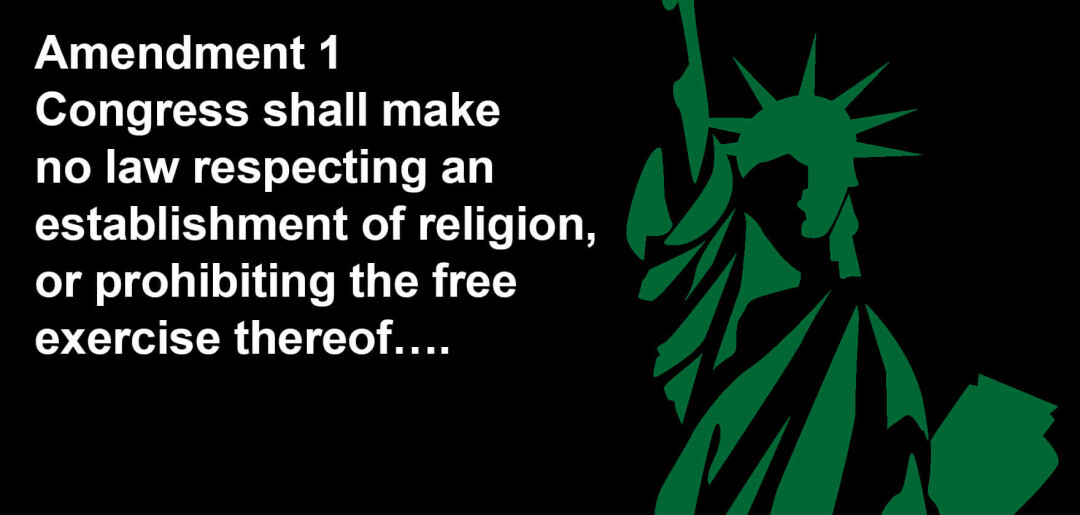Abusing religious freedom

“Congress shall make no law respecting an establishment of religion, or prohibiting the free exercise thereof...” The First Amendment
“Render unto Caesar the things that are Caesar’s, and unto God the things that are God’s” Matthew 22:21
The U.S. Supreme Court recently ruled that New York’s restrictions on in-person church services was a violation of the Constitution. In essence they said religious freedom takes precedence over public health during the pandemic. This ruling is disturbing for many reasons. It is another example of conservative “strict constructionist” judges “legislating from the bench” (which they claim to never do). It is another example of conservative judges ignoring past precedents, original intent and simple common sense to advance an ideological agenda.
This is not just a story of decades of Republican packing the courts with far-right ideologues. It is a story, unfortunately, of people unnecessarily getting sick and dying because of a toxic national obsession with indiv-idual freedom. Our unbalanced belief in the myth of rugged individualism and our inability to come together for the common good has plagued our nation from the beginning. Now it is killing us by the hun-dreds of thousands.
The case challenged New York’s restrictions on the size of public gatherings, including church services, in locations experiencing high rates of infection. The case originated with suits from a Catholic diocese and a Jewish synagogue and argued their constitutional right to freedom of religion prohibited the government from restricting in-person religious services. Specifically it was a violation of the “free exercise clause” of the First Amendment. The Supreme Court agreed.
In the majority opinion justices said, “The restrictions at issue here, by effectively barring many from attending religious services, strike at the very heart of the First Amendment’s guarantee of religious liberty.”
This is clearly nonsense. Virtual religious services are being used by many churches. Radio and television religious broadcasting is common. For as long as these media have existed, preachers have been conducting religious services and successfully separating the faithful from their money. So conducting online religious services during a pandemic clearly is not a significant limitation on the ability to worship or a threat to religious liberty.
In addition events surrounding the case point to the court looking for an excuse to advance a political agenda. The same issues had been decided in May and June with cases from California and Nevada. In those cases the court ruled (5-4) to allow the states to restrict attendance at religious services for public health reasons. The only difference in December was that liberal Justice Ruth Bader Ginsburg had been replaced by conservative Justice Amy Barrett.
The Supreme Court is very selective in the cases it chooses to hear. To hear the same issue, in the same year, is very unusual. In addition the case was moot by the time it reached the Supreme Court. New York had already lifted the restrictions on the churches bringing the suit. So there was no harm done to the religious freedom of the plaintiffs. Why would the Court bother with a moot case? Clearly they had an agenda they wanted to pursue.
This ruling does nothing for the plaintiffs but does create a real public health threat for rest of the country. As has happened in Wisconsin because of conservative court rulings, this decision will undermine legitimate public efforts to control the spread of the virus. Because church services involve large groups, they can be super spreader events. This unnecessarily affects the health of other people.
For decades conservative judges have been expanding the meaning of the First Amendment to create wholly new interpretations of religious freedom. The common thread of these rulings is that individual religious freedom can override the public good. Individual religious freedom is being used to justify discrimination and ignoring employment and equal opportunity laws. This twisted logic is being applied to protect businesses from legal requirements they don’t like.
For example Hobby Lobby, a national corporate chain store, can refuse to cover contraceptives for women under their group employee health insurance (in violation of the Affordable Care Act). A small business bakery can refuse to serve a gay couple because of the baker’s religious convictions (in violation of state laws against discrimination in public accommodations). Religious schools have been allowed to ignore laws against employment discrimination based on the employee’s religion. Pharmacists have been allowed to refuse to fill prescriptions for contraceptives claiming religious convictions.
Religious individuals and organizations, like all individuals, organizations and businesses, should operate within the laws of the nation. When they engage in non-religious public activities like employing people, operating businesses, schools, or resorts they should abide by same requirements as other individuals and businesses. In other words they should “render unto Caesar that which is Caesar’s.”
Religious freedom like all liberties is not unlimited. The exercise of all freedoms comes with responsibility and must be tempered by the public good to have a civil society. John Stewart Mills, in his famous work On Liberty, lays out the criteria, “...the only purpose for which power can be rightfully exercised over any member of a civilized community, against his will, is to prevent harm to others.”
In other words, your freedom to swing your arm stops at the nose of your neighbor. Society has a right, and obligation, to restrict your freedom when it negatively impacts others. Society uses laws and regulations to balance the rights of individuals with the rights of others and society as a whole. Historically courts have supported restrictions on individual freedom for these reasons.
Freedom FROM religion is just as important to liberty as “prohibiting the free exercise” of any sect. Religious freedom does not grant a right to impose your religious dogma on others. One’s religious beliefs does not provide special privileges. Religion should never be used to justify discrimination or harmful practices to others. Nor should religious dogma override pubic health protection during a pandemic.
